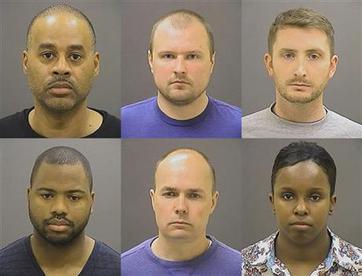
I don’t live in Baltimore. I will not be a juror on any of the cases relating to Freddie Gray’s death from injuries he sustained while in police custody. I’m not going to predict the verdicts in those cases, or speculate as to what those verdicts should be. Those accused of crimes are entitled to fair trials, presumption of innocence, and a burden on the prosecutor to prove the charges beyond reasonable doubt.
That said, the handling of this case, and of most alleged crimes in which police officers are suspects, demonstrates some severe inequities that tend to explain why we see people protesting police violence on the streets.
If you and I go out and abduct someone off the street, hog-tie him, throw him in a vehicle, then drop him off severely injured at a hospital, we’re not going to walk free for a week between then and his death. After he dies, we’re not going get ten days off with pay while a prosecutor conducts a leisurely investigation. We’re not going to make bail without seeing the inside of a holding cell (if we’re allowed bail at all).
We’re going to go directly to jail, without passing Go. We’re going to be immediately charged with kidnapping and assault, and a few days later we’re going to be charged with murder. We’re going to cool our heels in jail for a couple of days before our arraignments and bail hearings.
Freddie Gray was arrested on April 12. He died on April 19. It wasn’t until April 21 that the six officers involved in his abduction and death were suspended (with pay). They were not charged with a crime until May 1. Then they were booked and immediately released on bail.
The difference between you and I and those six cops is that they’re government employees with shiny badges. That’s it. That’s all.
Defenders of the existing system want us believe that, having entrusted those government employees with those shiny badges, we owe them an additional duty of special lenience and extra benefit of doubt in all situations even remotely related to the exercise of their duties.
I say that’s exactly backward. The standards of behavior for cops should be higher, not lower, than for civilians precisely because of the special powers with which they are entrusted.
As soon as it became clear that the officers who arrested Freddie Gray had abused those powers — stopping him without probable cause and arresting him on charges for which they possessed no evidence (the knife he was carrying was legal), they should have been arrested and charged with false imprisonment and armed criminal action. Followed, a few days later, by the charges relating to Gray’s death.
The “police force” as we know it is a young institution, dating back only a couple of centuries and mere decades in its current, abusively powerful form. The jury is still out on whether that institution can be reformed, or whether we’re better off abolishing it.
Thomas L. Knapp is director and senior news analyst at the William Lloyd Garrison Center for Libertarian Advocacy Journalism (thegarrisoncenter.org). He lives and works in north central Florida.
AUDIO VERSION
PUBLICATION/CITATION HISTORY
- “Cops should be held to higher standards,” by Thomas L. Knapp, Orangeburg, South Carolina Times and Democrat, 05/12/15
- “Cops should be held to higher, not lower, standards,” by Thomas L. Knapp, Ventura County, California Citizens Journal, 05/8/15
- “Police should be held to higher standard, not lower,” by Thomas L. Knapp, Libby, Montana Western News, 05/08/15
- “Cops should be held to higher, not lower, standards,” by Thomas L. Knapp, Muscatine, Iowa Journal, 05/09/15
- “Cops should be held to higher, not lower, standards,” by Thomas L. Knapp, Sonoran News [Arizona], 05/13/15

